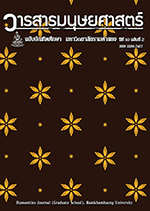วัจนกรรมการตอบการแสดงความผิดหวังในภาษาไทย : กรณีคู่สนทนาที่มีสถานภาพเท่ากัน
คำสำคัญ:
การตอบการแสดงความผิดหวัง, กลวิธีทางภาษา, ความสนิทของคู่สนทนา, สถานการณ์การสนทนา, วัจนกรรมบทคัดย่อ
บทคัดย่อ
งานวิจัยนี้มีวัตถุประสงค์เพื่อต้องการศึกษากลวิธีทางภาษาที่ผู้พูดภาษาไทยใช้ในวัจนกรรมการตอบการแสดงผิดหวังกรณีคู่สนทนาที่มีสถานภาพเท่ากันและพิจารณาผลของปัจจัยเรื่องความสนิทของคู่สนทนาและสถานการณ์การตอบการแสดงความผิดหวังที่มีผลเสียหรือไม่มีผลเสียต่อผู้ฟังที่มีต่อกลวิธีทางภาษาที่ใช้ในวัจนกรรมการตอบการแสดงความผิดหวังกรณีคู่สนทนาที่มีสถานภาพเท่ากัน ผู้วิจัยเก็บข้อมูลจากแบบสอบถามแบบเติมเต็มบทสนทนาชนิดให้เขียนตอบ (Written Discourse Completion Task ; WDCT) โดยกลุ่มตัวอย่างผู้พูดภาษาไทยที่ใช้ในงานวิจัยมีจำนวน 400 คน แบ่งเป็นเพศชาย 200 คน (แบ่งเป็นนิสิตนักศึกษาชายในมหาวิทยาลัยจำนวน 100 และบุคคลที่ทำงานแล้วเพศชายจำนวน 100 คน) และเพศหญิง 200 คน (แบ่งเป็นนิสิตนักศึกษาหญิงในมหาวิทยาลัยจำนวน 100 และบุคคลที่ทำงานแล้วเพศหญิงจำนวน 100 คน)
ผลการวิจัยพบว่ากลุ่มตัวอย่างผู้พูดภาษาไทยเลือกใช้กลวิธีทางภาษาในวัจนกรรมการตอบการแสดงความผิดหวังกรณีคู่สนทนาที่มีสถานภาพเท่ากันจำนวนทั้งสิ้น 5 กลวิธี เรียงลำดับความถี่จากมากไปหาน้อยได้ดังนี้ (1) กลวิธีทางภาษาแบบประนีประนอม (ร้อยละ 64.36) (2) กลวิธีทางภาษาแบบโน้มน้าว (ร้อยละ 14.35) (3) กลวิธีทางภาษาแบบหยอกล้อ (ร้อยละ 12.11) (4) กลวิธีทางภาษาแบบประชดประชัน (ร้อยละ5.00) และ (5) กลวิธีทางภาษาแบบกล่าวตรงไปตรงมา (ร้อยละ 4.18)
ส่วนผลการวิจัยเรื่องความสัมพันธ์ระหว่างกลวิธีทางภาษาที่ผู้พูดภาษาไทยใช้ในวัจนกรรมการตอบการแสดงความผิดหวังกรณีคู่สนทนาที่มีสถานภาพเท่ากันกับปัจจัยเรื่องความสนิทของคู่สนทนาและสถานการณ์การตอบการแสดงความผิดหวังที่มีผลเสียหรือไม่มีผลเสียต่อผู้ฟังพบว่าปัจจัยเรื่องความสนิทของคู่สนทนาและสถานการณ์การตอบการแสดงความผิดหวังที่มีผลเสียหรือไม่มีผลเสียต่อผู้ฟังมีผลต่อการเลือกใช้กลวิธีทางภาษาในวัจนกรรมการตอบการแสดงความผิดหวังของผู้พูดภาษาไทยกรณีคู่สนทนาที่มีสถานภาพเท่ากัน ผลการวิจัยข้างต้นสะท้อนให้เห็นถึงการหลีกเลี่ยงการเผชิญหน้าและการพูดอ้อมในการ
สนทนาของคนไทย
ดาวน์โหลด
เผยแพร่แล้ว
เวอร์ชัน
- 2022-11-22 (2)
- 2022-11-22 (1)





 ติดต่อสอบถาม คุณวรรณวิสาข์ (เอ็ม) โทร
ติดต่อสอบถาม คุณวรรณวิสาข์ (เอ็ม) โทร 
